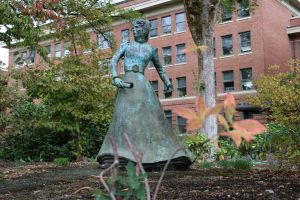Teacher Appreciation Week is Here
May 4, 2020
As much as we go to class and listen to our teachers explain new ideas and show us the makings of our world, how often do we say thank you? After over a decade of attending school nine months out of the year, the sparkle has probably worn off. Let us all use this year’s Teacher Appreciation week, starting today and running until May 8, as a time to break the silence.
Erin Kanzig, graduate student here at Oregon State University, gained her teaching experience with students much younger than the usual college freshman.
“Before coming to OSU for grad school I actually was a pre-k and kindergarten teacher, so while I had experience working with students, it was certainly a big shift for me. I help a sociology professor grade coursework and also offer support in class (well, when we have class in person) and have office hours for students to assist them with their assignments,” Kanzig said.
Kanzig loves working with undergrad students due to their hard work, curiosity and a bit of sassiness. The real reward for Kanzig is seeing students make new discoveries and connections as they progress
Kanzig thanks her Coalition of Graduate Employees, CGE, for helping herself, other TAs and research assistants get full tuition remission. This was the only way she could have taken the opportunity to go back to school. Students like Kanzig aren’t the only ones who need financial assistance, even teachers need help sometimes.
“Beyond sincere words of thanks, teacher appreciation should also be about paying teachers equitably, providing them with the resources they need to create flourishing classrooms and training to help them adapt to such a quickly changing world.” Kanzig said.
A favorite memory of Kanzig’s is sharing years alongside her mother learning at home. Every day Kanzig would sit down and be taught by her Mom, who started teaching years before her. Her mother’s lessons still help her to this day.
“My mom is a third grade public school teacher, and she’s absolutely phenomenal. I actually had the privilege of being homeschooled by her through fifth grade, and while that isn’t one specific memory, it’s years of labor and love that I will always appreciate,” Kanzig said. “I think that a general theme of ‘consistency’ is what stands out to me with the best teachers I’ve had: getting really detailed, thoughtful feedback on a paper I worked hard on, or always bringing a sweet treat before exams.”
Kelsey Kretschmer is a professor here at OSU who teaches sociology. According to Kretschmer, she gets about one or two students a term who approach her and thank her specifically. Usually this happens around the end of the term or when the student is graduating. Kretschmer loves hearing any feedback from students but enjoys the hopeful moments.
“I love to hear anything, but I find it especially meaningful to hear about how a student found the course material useful in some way, or how they see it reflected in the real world. I also really value hearing when a student was apprehensive about a course, but found success anyway,” Kretschmer said. “I also like to hear from prior students who are still thinking about course content even after they’ve graduated or otherwise moved on.”
One of the hardest things unanticipated by Kretschmer is the difficulty in balancing her own expectation of a course with the challenges students face outside of the classroom. Depression, healthy problems and economic struggles can cause students to become wary of course work.
“There is a very long list of things students struggle with. When they come to me with their problems, it’s very challenging to figure out how to balance the expectations I have to hold for the whole class with the fact that the student is a human being with needs that trump my class,” Kretschmer said. “I try to err on the side of the student.”
Kretschmer graduated from OSU in 2003 and now gets to work alongside the very professors that inspired her almost 20 years ago. Michelle Inderbitzen, Associate Professor in Sociology, was an important mentor to Kretschmer as she transitioned into graduate school. Another OSU instructor, Kathleen Stanley, a senior sociology instructor, was another inspiring teacher who helped Kretschmer in her decision to teach sociology. All this said, Kretschmer noted she could list at least another ten on this list who have been a part of her journey in education.
“I’ll say that there are different parts of my job (research and service, along with teaching) that compete for time. Teaching is by far the most rewarding. Bringing sociology to new students is the best part of this job.”





